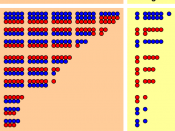The Electoral College system was designed by the founding fathers as an obstacle against the 'excesses of popular democracy,' a compromise between those who wished Congress to elect the President and those that yearned for the separation of powers theme. The threat of popular democracy equating 'mobocracy' is no longer seen as threatening in the modern America however; democracy has been seen as endangered by this College system. With the flaws of the system evident in numerous elections in the past as the 2000 election will prove questions are raised about the existence of such a system in American politics today. What needs to be addressed here is how such a controversial system has managed to survive through numerous flaws and criticisms.
The Electoral College has many faults. To start with the general ticket method of selectors using a 'winner takes all' of the state electoral vote has been disapproved.
The fact the winner may have a slim majority of the popular vote is argued to distort the real sentiments of the people leading to millions of votes being wasted and contributing to voter apathy. On a more serious note this can lead to a minority President as President Bush today proves further supported by the exact same scenario occurring in 1824, 1876 and 1888. Additionally argued it is said the general ticket leads the parties to concentrate far too heavily on the large marginal states and this allows disproportionate power to minority groups in those states for example the New York Jews. These minority groups are unlikely to favour reform that would see them lose the influence they enjoy. In addition it is argued big cities would lose power. Cities like Los Angeles attract more attention by the parties as they have a large electorate that could play a...



Elect
WOW, great paper and well done! Very informative. Well written!
2 out of 2 people found this comment useful.